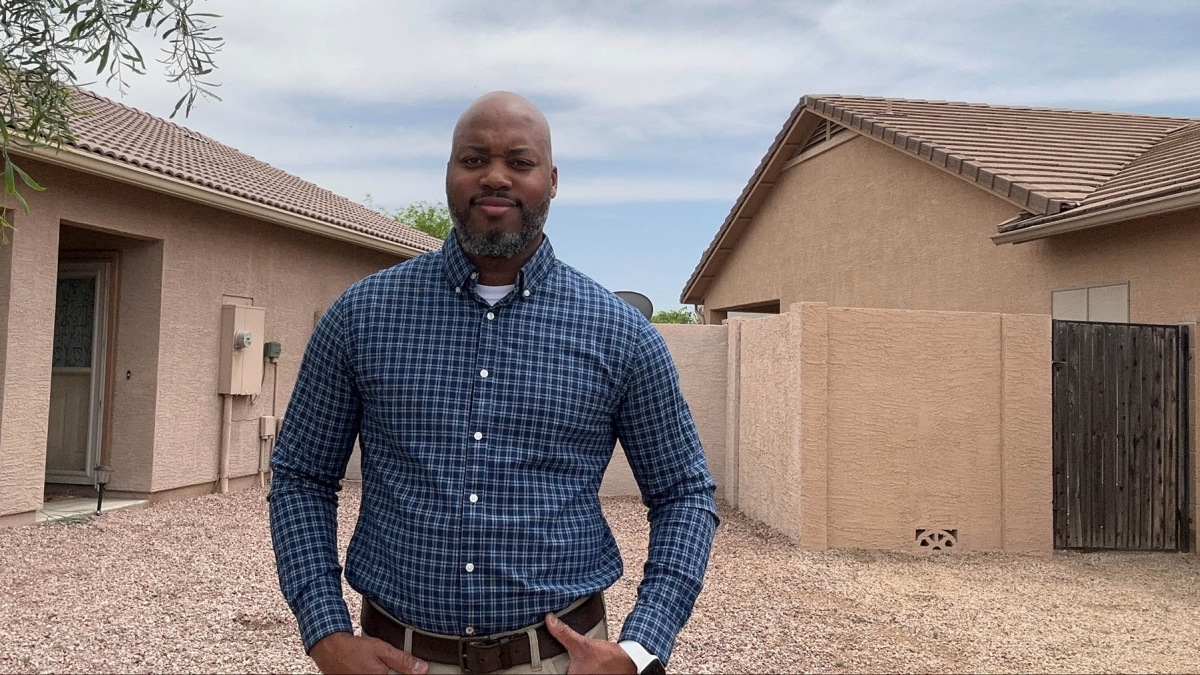14-year Marine veteran chooses ASU to launch 2nd act in project management

Antwon Eason
Editor’s note: This story is part of a series of profiles of notable spring 2023 graduates.
After serving 14 years in the U.S. Marine Corps, Antwon Eason decided to go back to school.
“I decided to finish what I’d started years ago,” said Eason, who is graduating this spring from Arizona State University’s College of Integrative Sciences and Arts with a bachelor’s degree in organizational leadership, with a concentration in project management.
He credits a mentor — his supervisor from the Marines Corps — for the encouragement to explore academic fields beyond his comfort zone.
“He asked me one day, with some puzzlement in his voice, 'Why did you choose to go back to school for weather forecasting?' — That was my job in the Marine Corps. — I told him, because that’s where all my experience is and it makes sense to me,” Eason said. “He then said to me, 'You have a golden opportunity to choose anything in the world to be — why not choose something new?' That’s when it clicked for me, that I should not be afraid to step out of my comfort zone to try something new.”
Eason, who is from Cleveland, said he chose to come to ASU, “because living in Phoenix was a major positive change coming from the Midwest. In addition, ASU had many interesting degree plans that appealed to my goals.
“Project management resonates the most with me out of all the degrees I viewed."
“I’ve had some great experiences along the way,” added Eason, “including meeting new friends and being taught by some amazing teachers.”
He said he especially enjoyed the class debates in the course Diversity in Organizations.
“It was so eye-opening to learn the perspectives of people of a variety of races, nationalities and age groups,” Eason said. “There were biases addressed that I was never aware of previously. I now have a greater appreciation for listening to others and their perspective.”
After graduation, he plans to stay in Phoenix for a few years as he starts his second career, and then may eventually move — “but to where is yet unknown! I plan to get a job in the project management field to gain enough experience to earn my Project Management Professional certificate,” Eason said, “then start working toward starting my own consulting business.”
Eason reflected about his ASU journey.
Question: What’s something you learned while at ASU — in the classroom or otherwise — that surprised you or changed your perspective?
Answer: I learned to be cognizant of how I word everyday statements such as “you guys,” because everyone may not want to be identified as a guy. Instead I should use statements such as “you all.” I also learned that the use of pronouns is a way to identify and respect how others want to identify as. Previously, I had no idea why everyone started using them on their email signatures.
Q: Which professor taught you the most important lesson while at ASU and what was it?
A: Dr. Marie Wallace taught me that we all have biases, whether we know it or not, and it is important to recognize and be aware of them when interacting with others. That stuck with me because I am very culturally diverse and I see the potential for not being aware of bias to be a problem when engaging with others. She also taught me that there is no such thing as a “bad child” instead it is a child with bad behavior. ... That just stuck with me and I correct myself every time I call a child bad.
Q: What’s the best piece of advice you would give students?
A: Take school seriously, because you may not understand the value of what you are learning now, but it will come full circle as you gain life experience. Additionally, make time for self-care. You can’t be focused and work to your best potential when you fail to properly care for yourself.
Q: What was your favorite spot on campus, whether for studying, meeting friends or just thinking about life?
A: My favorite place on Tempe campus was the science building where there is a fountain in the center of the building. I enjoyed having class there because it had an indoor-outdoor rainforest type of vibe going on. The sound of the fountain going was relaxing and reminded me of an oasis in the desert. I used to sit there to just relax before class and it was so peaceful.
Q: If someone gave you $40 million to solve one problem on our planet, what would you tackle?
A: With $40 million, the first issue I would tackle is preserving our coral reefs in the ocean. I am a huge advocate of ocean life. and I understand the impact that global warming has on the reef habitat. Our reefs serve multiple purposes such as housing various species of aquatic animals, and they provide climatological data that helps track global climate change. With reefs diminishing, they will cause a chain reaction that will adversely affect normal human lifestyles.
More Sun Devil community

Tested tips for taking exams
With May quickly approaching, many students are starting to prep for their most important tests of the year — final exams.Toni…

School of Transborder Studies celebrates 15th anniversary
During the summer before his freshman year at Arizona State University, Salvador Macias participated in the AGUILA Youth…

Barrett program unlocks study abroad for first-year honors students
Twenty first-year students from Barrett, The Honors College at Arizona State University are spending their second semester…

